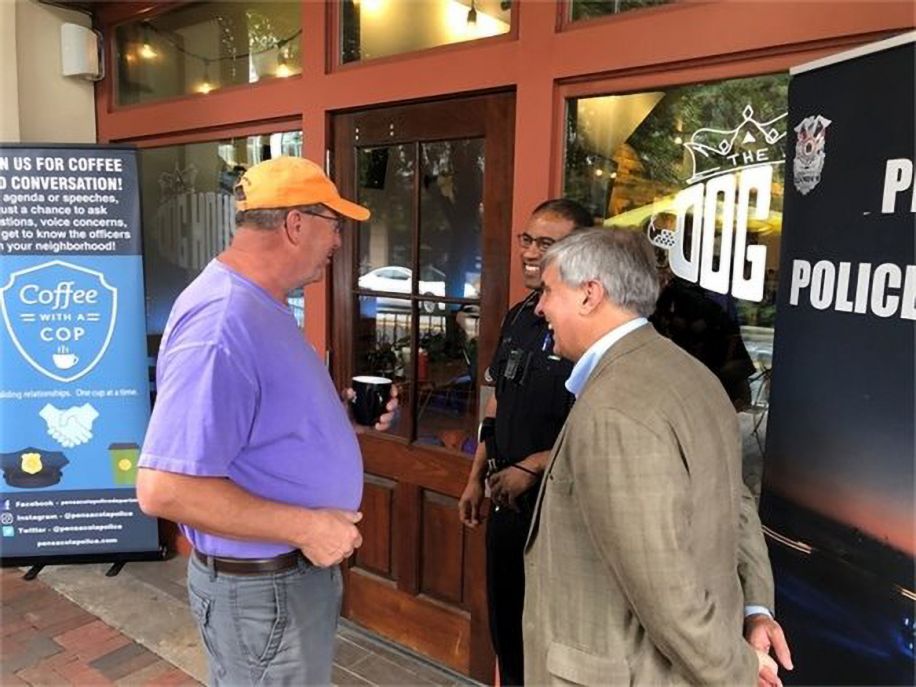By Gina Castro
In 2019, Pensacola had its challenges with violence: The terrorist attack at the Naval Air Station, the death of Tymar Crawford and an overall uptick in gun violence. In the summer of 2019, Mayor Grover Robinson made the decision to reach out to U.S. Attorney Lawerence Keefe for help from federal law enforcement. This relationship is now a federal task force, which is where the federal, state and local law enforcement agencies work together. Robinson announced, during his speech at Civicon on Jan. 27, that the City increased the Pensacola Police Department (PPD) training budget for the 2020 fiscal year by 75 percent, which puts the budget at $250,000. In the year prior, the budget was $150,000. Robinson said that there were a couple of variables that motivated him to increase the PPD’s training budget.
“I think it’s all about being better. Part of it is any time that we can be better, we want to be better. Our department is motivated to be better,” Robinson said. “But certainly, it’s been impacted by the high turnover in the senior staff and replacing them with younger officers.”

Although the grand jury decided, in October, that no charges will be filed against the PPD officer who shot and killed Crawford, the jury did recommend that all officers in the PPD should receive immediate retraining in the areas of use of force, use of deadly force and tasers. However, Robinson said that in August and September the City had already committed to increasing funding for training. “This was something we already knew we needed to be doing partly because we knew we had a younger force and we were losing a lot of veteran leadership,” Robinson said.
The federal enforcement supplied some free training including the VALOR Officer Safety and Wellness program. This program focuses on improving the health and resilience of officers to prevent injuries and death for both officers and civilians. Robinson said that the program BLAST (building lasting relationships between police and community) is also being reintroduced to the PPD. This program comes from the department of justice and offers students an opportunity to meet representatives of the criminal justice community and ask them questions, share their perceptions of law enforcement, and interact with law enforcement officers in a familiar setting. Law enforcement officers also provide students with their perspective on responding to dangerous or uncertain circumstances and the importance of remaining calm and following the officers’ directions in these situations. Robinson said that the PPD has done BLAST in the past, but with the increase in their training budget, the PPD will have more BLAST sessions scheduled this year.
As an effort to emphasize the importance of sensitivity training, the PPD will be using the expertise of Cedric Alexander, who has more than 40 years of experience as an officer. Alexander served as Chief of Police for DeKalb County, which is a large metropolitan county with more than 700,000 citizens. “[Alexander] has a wealth of experience dealing with significant metro police forces both within the department and as chief as well as an administrative position over police departments,” Robinson said. “He comes to it with a wealth of experience, and we’re looking to implement some of those things. When I talked to Chief Lyter and his leadership team, they were very impressed with the training [Alexander] is bringing forward.”
Alexander did some training with the PPD in the early 2000s, and Robinson said that the PPD grew from that experience. “I talked with several captains who remembered training with him in the early 2000s,” Robinson said. “They said they were very happy to get him back again.”
Alexander also has experience with citizen advisory committees. After the shooting of Crawford occurred, the Pensacola Dream Defenders requested the City implement a civilian oversight board, but Robinson decided to implement an advisory committee instead. Alexander said that it’s important for any city that is concerned about public safety in America to have an advisory committee. “Everyone is concerned about public safety, but in order for police officers to provide good public safety, there has to be a partnership between local police and the community,” Alexander said. “That means that they work collaboratively together in order to reduce crime and help keep the community safe. That is, the police are the community and the community is the police.”
Robinson and Alexander are still working on establishing this advisory committee, but Robinson said that they plan to have progress on the committee in the coming month. Robinson also said that the PPD has always had a consistent monthly training schedule and will continue to do so. However, they will be introducing different training programs and tactics to the monthly training routine.